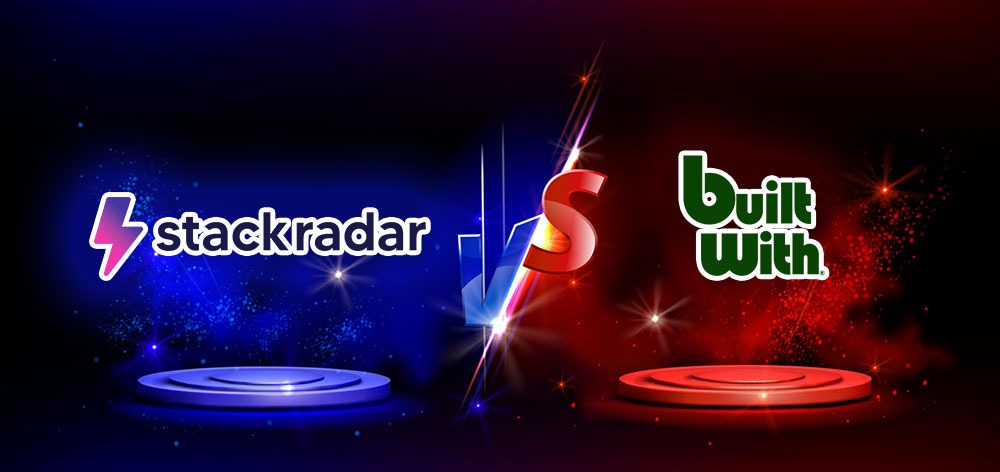Stack Radar vs. BuiltWith: Track Website Technologies Smarter in 2025
Compare Stack Radar and BuiltWith. Discover a smarter way to track website technologies at scale. Built for sales, marketing, and digital growth teams.
TECH STACK TRACKINGMARTECH TRENDSCOMPETITIVE INTELLIGENCEGROWTH TIPS


Looking for a better way to track the technologies used by websites?
You've probably come across BuiltWith, the well-known tool for identifying tech stacks. But in 2025, there's a modern alternative gaining momentum: Stack Radar.
In this comparison, we break down how Stack Radar and BuiltWith differ, which features matter most, and why more marketers and sales teams are switching to smarter, more actionable tracking tools.
What Is BuiltWith?
BuiltWith is a web technology profiler that lets users see what tools and platforms a website is using. You can check if a site runs on WordPress, uses Google Tag Manager, Shopify, HubSpot, and more.
It’s widely used for:
Competitive research
Market trend analysis
SEO and PPC strategy planning
But while BuiltWith provides useful data, it has a few limitations. Its technology reports are updated periodically, not continuously. Users must manually recheck sites to see if anything changed. Filtering capabilities are limited, and there’s no built-in alert system to notify you of changes.
What Is Stack Radar?
Stack Radar is a technology tracking platform that monitors millions of websites and highlights when their tech stacks change. Whether a company starts using Salesforce, switches from Mailchimp to Klaviyo, or adds a new analytics tool, Stack Radar makes those changes visible through its tracking system.
It’s designed for:
Sales teams looking for high-intent leads
Marketing and growth professionals identifying trends
Digital agencies targeting companies based on technology use
It also powers some of the most-read insights in the industry, including:
📊 Top Martech Trends in 2025
🤖 How AI Is Reshaping Martech Spend
🧠 Why Track Competitor Tags
BuiltWith vs. Stack Radar: Key Differences
1. Technology Change Tracking
BuiltWith provides a snapshot of technologies on a site at the time of scan. Stack Radar detects and displays changes on monitored domains as updates are processed, making it easier to spot recent adoption trends.
2. Smart Filtering by Company Data
Stack Radar lets you filter companies by country, industry, company size, and technology category. This level of targeting isn’t available in BuiltWith’s free experience.
3. Outreach and Prospecting Value
Stack Radar is designed to support timing-based outreach by showing recent technology adoption or removal — helping you reach out when companies are most likely to need your solution.
4. Interface and Workflow
Stack Radar’s interface is streamlined and modern, built for marketers, sales pros, and digital teams who want insights they can act on quickly.
Why Timing Still Matters
Whether a company is starting a new ad campaign, switching CRM platforms, or trying out a new customer engagement tool, these are moments of opportunity. Stack Radar gives you visibility into these changes, even if there’s a short delay in data processing.
If you want to position your offer at the right moment, this kind of insight can make the difference between a missed chance and a closed deal.
Want to go deeper? Read: Why Tech Companies Must Track Competitor Tags
When to Choose Stack Radar Over BuiltWith
Choose BuiltWith if:
You need basic tech snapshots
You’re doing high-level competitor research
You don’t need recent or filtered data
Choose Stack Radar if:
You want visibility into tech changes across millions of companies
You need filters by company size, location, or industry
You work in sales, marketing, or growth
You want to build lists based on tool usage and market shifts
Final Verdict
BuiltWith has been around a long time and remains a useful tool. But if you're looking for fresher, more targeted data with better filtering and workflows made for business teams, Stack Radar is the smarter choice.
Thousands of companies already use Stack Radar to monitor technology usage and spot new opportunities. Try it out and see how it can sharpen your strategy.


